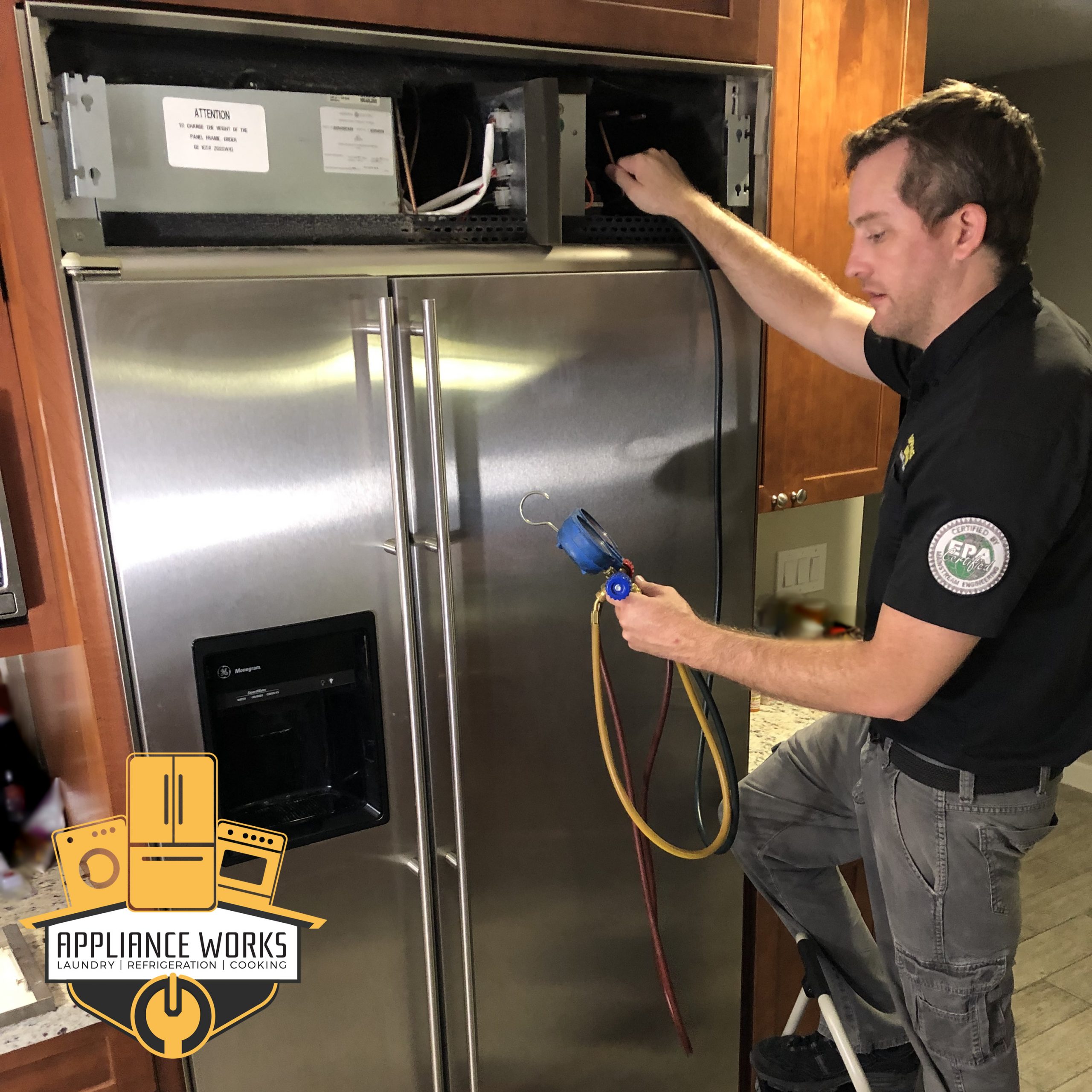Refrigerator Not Cooling? Refrigerator repair experts Dependable Refrigeration & Appliance Repair Offer Quick Troubleshooting Tips
Refrigerator Not Cooling? Refrigerator repair experts Dependable Refrigeration & Appliance Repair Offer Quick Troubleshooting Tips
Blog Article
Crucial Tips for Effective Ref Repair to Extend Appliance Lifespan
When it comes to your refrigerator, proper repair and maintenance are important for long life. Understanding usual problems and understanding when to act can make all the distinction.
Recognizing Usual Refrigerator Problems
Fridges are necessary in keeping your food fresh, yet they can encounter a range of common troubles that disrupt their performance. If you observe food spoiling quicker than common, inspect the thermostat settings or think about if the door seals are damaged. Recognizing these concerns early can save you time and money in repairs, guaranteeing your fridge runs smoothly and successfully.
Routine Maintenance Practices
To keep your devices running smoothly, you need to remain on top of regular maintenance practices. Clean the condenser coils, examine the door seals, and monitor the temperature setups to assure peak efficiency. These straightforward tasks can save you time and cash on repairs down the line.
Clean Condenser Coils Regularly
Cleaning your condenser coils regularly can considerably enhance your appliance's performance. Dirt and dust develop up on these coils gradually, triggering your device to function tougher and consume even more power. To keep them tidy, unplug your device and thoroughly remove any type of protective covers. Use a vacuum cleaner with a brush attachment or a soft brush to carefully eliminate debris. If needed, a mixture of cozy water and moderate cleaning agent can help get rid of persistent grime. Ensure to allow whatever completely dry entirely before reconstructing and plugging the home appliance back in. Purpose to cleanse your coils at the very least twice a year, or regularly if you have pet dogs or live in a dirty environment. This straightforward task can expand the life expectancy of your appliance considerably.
Inspect Door Seals
Three straightforward steps can aid you assure your appliance's door seals are in great problem. Second, tidy the seals making use of warm, soapy water to get rid of any particles or gunk. By adhering to these actions, you'll maintain your device's effectiveness and longevity, saving you money on power expenses and repair services in the long run.
Screen Temperature Setups
Routinely monitoring your home appliance's temperature setups is necessary for best performance and efficiency. Whether you're managing a fridge, fridge freezer, or oven, keeping an eye on these setups can stop many concerns. For refrigerators, aim for temperature levels in between 35 ° F and 38 ° F; for freezers, stick around 0 ° F. If the temperatures are expensive or reduced, your device might work harder, throwing away power and shortening its lifespan. Utilize a thermometer to examine these settings consistently, especially after major modifications, like moving your appliance or adjusting the thermostat. If you discover fluctuations, readjust the settings as necessary and seek advice from the customer manual for assistance. By remaining aggressive about temperature level tracking, you'll assure your devices run efficiently and last much longer.
Repairing Cooling Problems
When your fridge isn't cooling effectively, it can lead to ruined food and wasted money, so dealing with the issue immediately is essential. Start by inspecting the temperature setups to confirm they're at the advised degrees, generally around 37 ° F for the fridge and 0 ° F for the freezer. If the settings are right, inspect the door seals for any kind of gaps or damage; a faulty seal can enable cozy air to enter.
Check the condenser coils, normally situated at the back or base of the unit. Tidy them with a vacuum or brush to enhance performance. If problems linger, it might be time to call a professional.
Repairing Water Leakage and Ice Accumulation
If you're taking care of water leak or ice accumulation in your device, it's important to determine the resource of the issue. By identifying where the water is coming from, you can prevent additional issues and stay clear of expensive repair work. Allow's check out some reliable techniques to deal with these typical issues.
Identify Leak Resources
Just how can you efficiently recognize the sources of water leakage and ice build-up in your appliances? Start by examining the seals and gaskets on your fridge and fridge freezer doors. A worn or broken seal can allow warm air to enter, causing condensation and ice. Next off, examine the drain frying pan and water drainage system for obstructions or blockages; a backed-up drainpipe can result in water pooling. Look for any type of loose connections in the water supply line, which can develop leakages. Additionally, examine the defrost drainpipe for ice build-up, which could disrupt proper drain. By systematically inspecting these locations, you'll pinpoint the resource of the issue, permitting you to take the essential steps to repair it and expand your appliance's life-span.
Prevent Ice Formation
To protect against ice formation in your devices, beginning by verifying the temperature settings are ideal. If your fridge or fridge freezer is as well cold, it can cause excessive ice build-up. Inspect the door seals consistently; harmed seals can let cozy air in, causing condensation and ice development.
Keep the appliance well-ventilated and stay clear of lg washing machine pump replacement overcrowding, as this can obstruct airflow - Dependable Refrigeration & Appliance Repair Service LG Appliance Repair. Also, consistently thaw your fridge freezer if it does not have an automatic defrost function.
If you observe water leak, determine and take care of any type of blocked drainage holes, as they can add to ice buildup. Tidy the coils and confirm they're working correctly to keep peak efficiency. Taking these steps will assist expand your home appliance's lifespan and efficiency.
Addressing Noisy Refrigerator Sounds
While it may appear alarming, a noisy refrigerator typically signals small problems rather than significant malfunctions. Identify the resource of the sound. Typical offenders include the compressor, fans, and water lines. If you listen to a buzzing audio, it may be the compressor functioning hard; this could simply be a normal operation noise.
Following, look for loosened items inside. Sometimes, containers or shelves can rattle, creating unwanted noise. Tighten or reposition them visit to get rid of the sounds.
If you notice a clicking sound, it could be the defrost timer. This is generally harmless yet can indicate it requires inspection.
Lastly, verify your refrigerator is level. An unbalanced home appliance can generate vibrations and noise. Use a degree to inspect, and change the feet if required. Addressing these problems promptly can help maintain your fridge's performance and lengthen its life-span.
When to Change Parts vs. Full Replacement

Nonetheless, if your appliance is older and experiencing multiple problems, a complete replacement can be extra cost-effective. Think about the cost of repair work versus the home appliance's worth. If repairs go beyond 50% of a new device's price, it's normally better to invest in a replacement. Furthermore, if you see continuous troubles that maintain recurring, it's an indicator that your home appliance has actually gotten to the end of its life. Evaluate these variables meticulously to make the best decision for your requirements and spending plan.
Understanding When to Call a Specialist
Just how can you inform when it's time to employ a professional for device fixing? If you notice uncommon sounds, smells, or leakages, it's a clear signal that something's wrong. Don't overlook these signs; they commonly show deeper problems. If your appliance quits working altogether or regularly trips circuit breakers, it's another red flag.
You should also consider your very own comfort degree with repairs. If you're not sure concerning diagnosing the issue or lack the right tools, it's finest to connect for aid. Bear in mind, attempting complex repairs can bring about more damage and even security threats.

Regularly Asked Inquiries
Just how Frequently Should I Tidy the Fridge Coils?
You must cleanse your refrigerator coils every six months. This aids preserve efficiency and protects against getting too hot. If you see excessive dust or family pet hair, clean them extra frequently to guarantee your refrigerator runs efficiently.

Can I Make Use Of Vinegar for Cleaning My Fridge?
Yes, you can use vinegar to cleanse your refrigerator! It's an exceptional natural cleanser that removes odors and spots. GE appliance repair Oro Valley Dependable Refrigeration & Appliance Repair Service. Just blend it with water, apply it to surface areas, and clean down for a fresh, tidy fridge
What Temperature level Should My Fridge Be Set To?
You must establish your fridge to 37 ° F(3 ° C) for perfect food conservation. This temperature level keeps your food fresh while preventing spoilage, ensuring your grocery stores last much longer and lowering waste. It's an easy change you can make!
Does a Fridge Required to Be Leveled?
Yes, your fridge needs to be leveled. If it's uneven, it can impact cooling down effectiveness and trigger excess noise. Examine the leveling legs and adjust them to guarantee correct balance for perfect efficiency.
How Can I Lower Refrigerator Power Consumption?
To reduce your fridge's energy consumption, maintain it clean and well-ventilated, examine door seals for leakages, set the temperature between 35-38 ° F, and avoid straining it. These actions can considerably lower your energy expenses.
Report this page